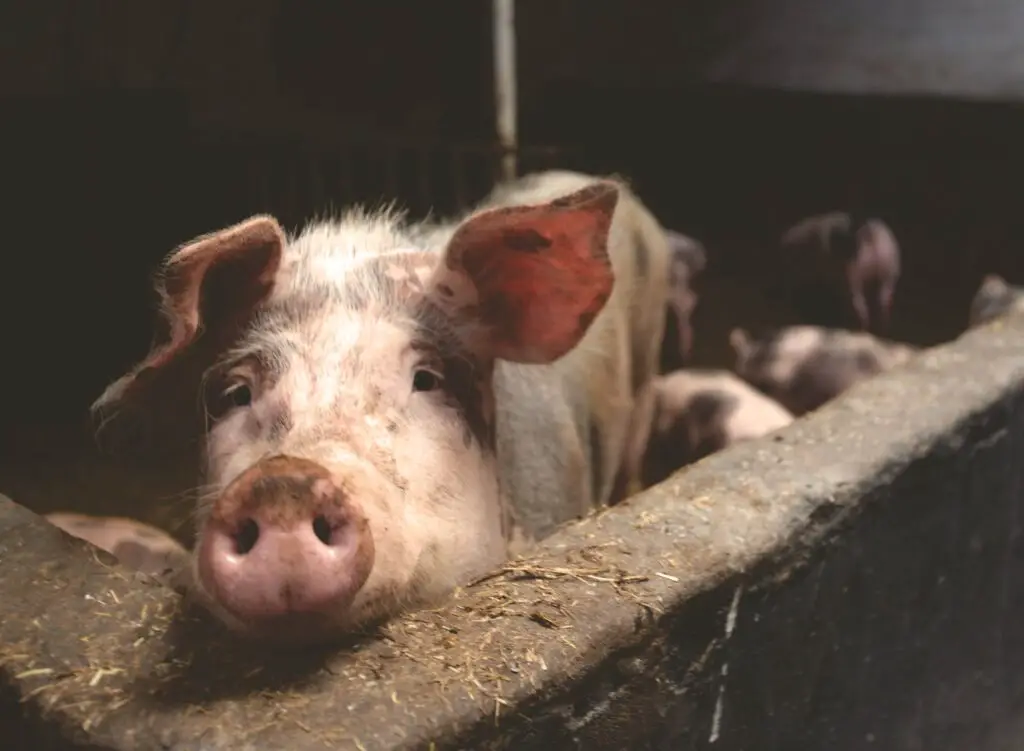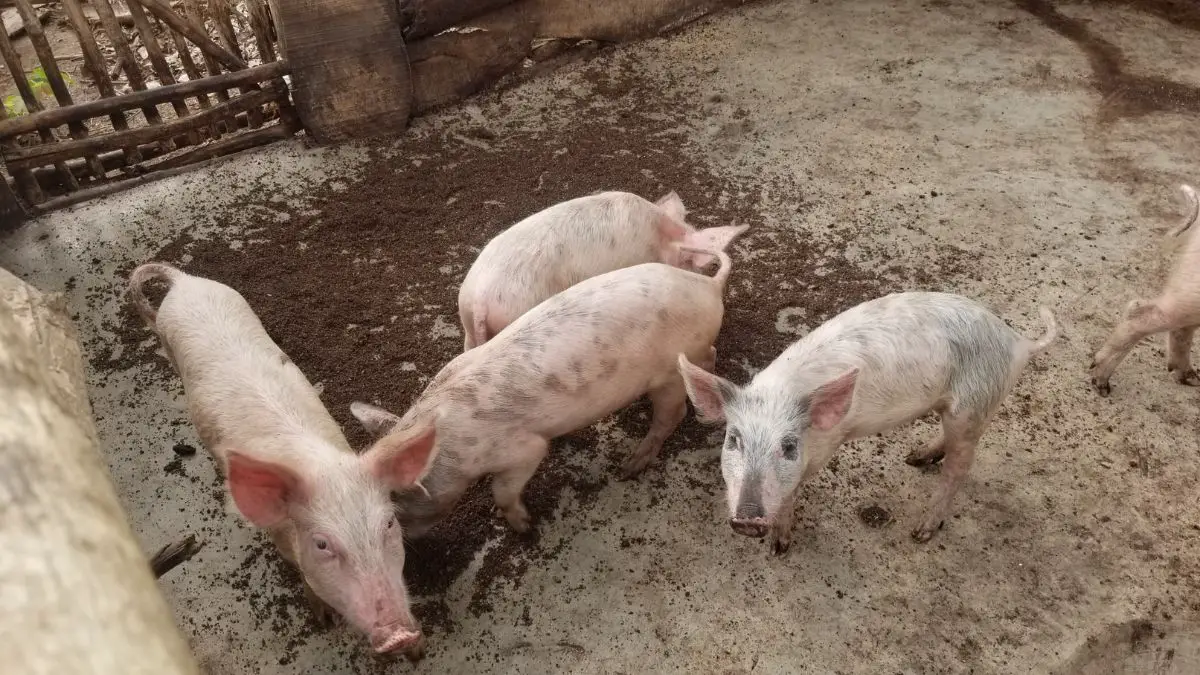Some links on this page may contain affiliate links which means that, if you choose to make a purchase using the link, Agricfy.com may earn a small commission at no extra cost to you. For more information, go to our Affiliate Disclosure Page!
Introduction
Have you ever thought of starting livestock farming? After research and analysis, you have eventually decided to go into pig farming.
But the problem now is How do I start a pig farm?
Are you venturing into livestock rearing, and you’re thinking; how to start a pig farm?
Pig farming is one of the lucrative agriculture/livestock farming businesses.
However, it can only be profitable for you if you do it the right way.
You’ll need some guidelines to guide you through the necessary steps to take for you just starting or looking to expand your business.
This blog post will tell you all you need to know to start and run a lucrative pig farm business.
Read on to discover;
- The necessary steps you need to take before starting a pig farming business
- How to start a pig farm business
- How much does it cost to start a pig farm business (Estimates)
- Advantages/benefits of starting a pig farming business
- Drawbacks/challenges in the pig farming business
First, What to do Before Starting A Pig Farming Business
Steps To Take Before Starting A Pig Farming Business
There are several things you need to do before starting a pig farming business or any business at all, and they include;
1. Set Your Objectives or Goals
Having clear goals or objectives before you do anything or start any business is one of the essential requirements for success.
The same applies to the pig farming business.
This is because it helps you focus and have a clear sense of direction.
Even more, it makes your goals easily achievable.
So, before starting a pig farming business, clearly define your goals and objectives.
- Why are you starting the business?
- Are you starting the business for commercial or personal purposes?
- What do you hope to achieve with the business?
- Why is the business important to you?
Overall, asking yourself these types of questions helps to put things in perspective.
2. Research More About the Nature of the Business
Before starting a pig farming business, you should also acquaint yourself with some essential aspects of the business.
Find out what the business is like.
Is it something you’ll have the time for?
Also, is it something you can commit yourself to for a long time?
Do you have the finances/resources for it?
If not, how do you plan on getting the required finances/resources?
It’s not enough to just decide to start a pig farming business. You need to be physically, financially, and mentally prepared to handle the business. Doing proper research will help you figure out what it takes.
3. Have a Business Plan
It always helps to have a business plan regardless of the type of business you want to start.
A business plan is a blueprint or road map for your business.
It explains how you intend to run your business and the important decisions you intend to make at various stages of your business.
Likewise, it’s an important document you’ll need to present to investors if you plan to secure funding for your pig farming business from investors.
It contains all the necessary information that the investors need to know about your business. Hence the need for you to have a business plan for your pig farming business.
Creating a business plan requires careful research and analysis of the business. You may want to take some time to do this or hire a professional to get the best.
4. Acquire Some Basic Knowledge/Skills/Training About the Business
Pig farming involves a lot, from rearing the pigs to feeding them, providing shelter, taking care of them, and selling them to the target market.
Hence, you need to be familiar with these basic steps and processes if you want to run a profitable pig farming business.
You could take some training from a mentor, an expert in the business, or a specialized pig farming training center.
You don’t need to be an expert. You just have to know the basic skills to get started then you can learn and become better as the business grows.
5. Identify Your Target Market
If you must run a profitable pig farming business, then you must sell to the right people.
The people who will buy your livestock products are your target market. So you must ensure that they need your products.
Do you plan to sell your pigs to companies or markets that sell pork? Or do you plan to sell live pigs to other people looking to start a pig farming business?
Identifying your target market ensures that you sell to the right people.
Thus helping you make profits in the business.
6. Determine the Location For Your Pig Farming Business
Of course, you’ll need a place to rear your pigs.
Hence, you need to decide on the location you’ll use.
Do you plan to use an open space or a residential area?
Also, you need to ensure that there are no environmental restrictions preventing you from doing your pig farming business in that location.
This will help you prevent legal issues that may set back your business.
Overall, these are some of the things you need to take care of before starting a pig farming business.
Now, let’s dive into how to start a pig farming business.
How to Start a Pig Farming Business

Before taking the following steps, you’ve already secured a good location or breeding ground for the pigs.
You’ve also taken care of the various environmental guidelines/restrictions to ensure no legal problems come up in the future due to your pig farming activities in that location.
You’ve already secured your target market/customers and have acquired the basic skills on how to rear and take care of your piggery farm.
More importantly, you also have a solid business plan on how to run your pig farming business.
You’re all set up for success.
Now, here are some guidelines on how to start a pig farm business.
1. Build the Piggery Housing/Shelter
Building pig pens is essential for several reasons.
First, it is essential to protect the pigs from predators and thieves, especially if you’re using an open space.
Also, it is essential to prevent the pigs from injuring themselves.
So, it’s essential that you construct suitable pig pens/housing.
It should be spacious to give the pigs adequate space to move around freely.
Also, you should make a water pool area where the pigs can swim and cool off.
This is essential for the pigs’ health and overall well-being.
The pig housing should also have a good drainage system to avoid water stagnation which could harbor disease-causing organisms.
Thereby endangering the pigs’ health.
2. Purchase Healthy Piglets
For a good start, it’s best to buy healthy piglets.
When buying piglets, keep these guidelines in mind.
- Buy from a trusted source (Someone with a good track record of selling healthy piglets)
- Also, buy piglets that have undergone several vaccination processes.
- Buy a small number of piglets at the initial stage of the pig farming business, then as the business grows and you become more familiar with the breeding process, you can buy more piglets.
Overall, these guidelines make your risk of losses minimal.
3. Consult/Hire A Veterinary Doctor
To ensure that you breed healthy pigs and run a successful pig-farming business, you’ll need the services of a veterinary doctor.
The veterinary doctor will perform regular checkups and vaccination on the pigs.
Also, the vet will ensure proper feeding and nutrition practices for your pigs.
So, depending on your finances, you could hire a full-time veterinary doctor as your employee.
Otherwise, you could pay the Vet to check up on the pigs regularly.
Above all, having a Vet take care of your pigs is non-negotiable when running a pig farm business.
4. Hire Workers/Labourers
Depending on the size of your pig farm business (large or small scale), you’ll need to hire people to assist you on the farm.
You’ll need help cleaning the pig shelter, feeding the pigs, and keeping the pigs safe from harm.
Hence, hiring people to assist you in these areas would be a good investment.
For a small-scale farm, 4-5 persons would do, while you may need to hire 10-15 persons for a large-scale farm.
5. Purchase Good Feeds
Your pig’s health largely depends on how well you feed them.
This is why you should ensure that you feed the pigs with the right food and appropriately.
Pigs need feeds rich in fiber, carbohydrates, vitamins, protein, and minerals to grow properly.
Overall, buying good feeds is an essential investment in the growth and development of your pigs.
6. Provide Clean Drinking Water
Clean drinkable water is also essential for the pigs’ overall well-being.
Hence, you’ll need to make this available on your pig farm.
Also, due to pigs’ nature, you’ll need to constantly check and change the water to ensure that their drinking water is always clean.
The best way to ensure this is to use galvanized water troughs to provide drinking water for the pigs.
These types of watering troughs are easy to clean and maintain.
Overall, these are some of the essential steps to starting a pig farming business.
However, another essential aspect that cannot be overlooked is the cost of starting the business.
Hence, let’s consider the cost of starting a pig farm business.
How Much Does It Cost To Start A Pig Farm Business

Here is the estimated cost for starting a pig farm business using Nigeria as a case study.
NOTE: The amount mentioned will vary from time to time and also depending on your location.
- Land
Buying land would cost you about N600,000 – N5,000,000, depending on the land size and location.
However, if you already have suitable land, you can save yourself this cost.
- Constructing piggery housing or shelter
It should cost you about N350,000 – N400,000 to construct the piggery housing and pool.
- Buying Piglets
Assuming you want to start with 50 piglets and each one costs N5,000.
N5,000 multiplied by 50 = N250,000.
- Feeds
If the pig feeds costs N24,000 and you buy enough to last you for 7 months, N24,000 multiplied by 7 = N168,000
- Labour & Logistics
Paying your laborers and for other services may cost about N150,000
- Equipment Purchase
You’ll need equipment such as a pig farrowing crate, piglet nursery crate, pig gestation crate, watering troughs, heat lamps, cleaning supplies, etc.
All these may cost you about N250,000 – N300,000.
Total: N 1,768,0000 – N 6,268, 000
Note, that land is the most important and expensive thing you need to start a pig farm.
However, if you already have suitable land, you can start a pig farm for much less than the estimated cost.
Now that you know how much it costs to start pig farming in Nigeria, you may be wondering if it’s worth your investment.
Well, yes, it is; here are several reasons you should start a pig farming business.
Benefits/Advantages of Pig Farming Business
- Pigs have the highest breeding potential capacity (one pig can give birth to 10 to 12 piglets at once)
- They have a fast growth rate (If you feed them well, they could grow and mature quickly so you could sell them off and start making within the shortest time frame)
- Also, there’s a high demand for pork in local and foreign markets.
- They have a high feed conversion rate. When you feed them well, the more flesh they add and the more meat you get out of them.
- Also, you can make money from their waste products (pig dung can be used for manure)
- Lastly, setting up the farm is easy.
Overall, these are some of the things that make the pig farming business a highly profitable business and worth your investment.
Every business has its challenges, and there are some challenges in the pig farming business.
Let’s consider what these challenges are.
Challenges or Drawbacks In The Pig Farming Business
- Cannibalism: Some sows (female pigs) eat their piglets during farrowing
- Also, some pigs could easily crush their young ones while moving around in the pens or sleeping.
- Pigs are highly prone to diseases due to their delicate nature, especially piglets. This could lead to high mortality rates and a massive loss for the farmer.
- You’ll spend more on water and electricity, especially in areas where water and electricity are not readily available. This is because pigs consume a lot of water.
- Lastly, you’ll have to deal with offensive odor from the pigs.
As said earlier, every business has its challenges and risk.
However, by taking some necessary precautionary steps, you can make the risks more manageable and avert the damaging consequence.
The same applies to the pig farming business.
Yes, it has its drawbacks.
However, you can avert the negative consequences of these drawbacks by taking care of the pigs diligently.
Conclusion
If you are a risk taker and looking to start a very lucrative business, then going into the pig business is one you should consider. It has its own drawbacks but I can assure you that its benefits outweigh the challenges.
In all, the pig farming business is very lucrative and a good investment of your time and money.
However, to see the returns on your pig farming investment, you need to put in the hard work and commitment to take care of your pigs and market your products to the right people so you can make sales and profits in your business.
If you want a good laugh and motivation to start your own pig farm, read these quotes I wrote on pig farming.
Good luck!








I want to begin a pig farm. I have a land fenced. I have two sow and a male.
Usually I do not learn article on blogs, however I would like to say that this write-up very pressured me to check out and do it! Your writing style has been amazed me. Thanks, very great article.
Thank you so much for your advice I want to start it I have only 500k but my problem is where to buy the good piglet
Depending on your location, you can easy get a good piglet from farmers that are trust worthy
Am doing well in the business,i want to much about there feed.
Am doing well in the business, but I want to know much about there feed.
Nice one, I learned some vital things.
Thanks